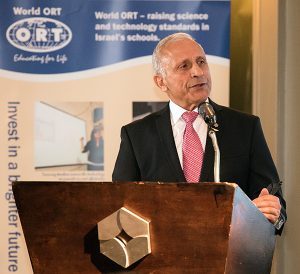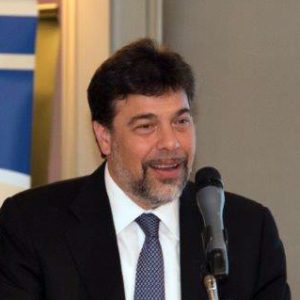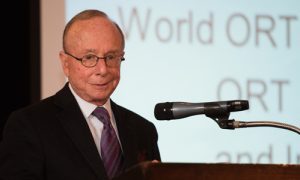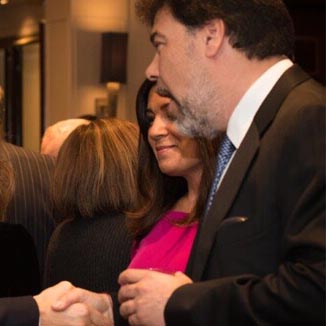Technology education is a vital component of an effective national security strategy, which is why the former commander of the Israeli Air Force, Major General (Ret.) Eitan Ben-Eliyahu, is such a fan of World ORT.
With technicians and engineers constituting about 40 per cent of military manpower, STEM education has never been so important – particularly for a country like Israel, surrounded by enemies.
“Ben Gurion said it: they are many, we are few; they have endless resources and we have just a little. The only way to deal with such an asymmetrical situation is to build national security on technology and quality of man power.” Major General Ben-Eliyahu told members of World ORT’s Board of Trustees and their dinner guests in London.

Major General Ben-Eliyahu
Israel has been at the forefront of the technological revolution which has vastly enhanced the military’s intelligence capabilities, its productivity, efficiency and lethality and it needs people capable of operating, maintaining and inventing new systems.
But Israel has to devote more than six per cent of its GDP on defence; the United States figure is less than five per cent, the United Kingdom less than four.
“More than 16 per cent of the Israeli budget is spent on national security but less than 14 per cent on education. That’s a real dilemma; I wish we could spend much, much more on education. Technology education contributes to national defence, the national economy and to the welfare of individuals. World ORT is a facilitator in that. You are helping to close the gap between government expenditure on security versus education. I admire what you’re doing,” said Major General Ben-Eliyahu, who flew as fighter escort during Operation Opera, which resulted in the destruction of Iraq’s Osirak nuclear reactor in 1981.
His words were an indication of how World ORT Kadima Mada’s role in raising the quality and appeal of STEM subjects in Israel has grown increasingly influential – from installing Smart Boards to providing affordable and substantial extra-curricular classes; from introducing innovative pedagogical techniques to teacher training. World ORT’s operational arm in the Jewish State now has a network of six schools, supports some 30 affiliated schools and is a trusted and respected partner of the country’s Ministry of Education.
His speech was also an acknowledgement of the massive contribution made by the people in the room: donors, such as Graham Edwards, who was presented with a specially minted medal on his admission to World ORT’s elite donors group, The 1880 Society, and members of the Board of Trustees, whose three meetings each year direct World ORT’s policies.
The London meeting was the first since the Board’s new line-up of people from the USA, Argentina, Israel, Peru, Mexico, the UK, and Bulgaria was elected at the World ORT General Assembly in Jerusalem earlier this year and their passion for ORT was evident.
Dario Werthein, the new Chairman, quoted Shimon Peres a”h, who said, “My greatest mistake is that my dreams were too small. I tell people to not dream small because you can make your dreams come true,” to which Mr Werthein added: “I think ORT can be a dream, we can make it and we can make it come true.”

World ORT Board of Trustees Chairman Dario Werthein.
Mr Werthein is the latest generation of a family who have dared to dream – his grandfather founded ORT Argentina and his mother is a past president of the organisation. It is a dream which has captured the imaginations of millions who have striven to make it a reality since 1880.
“What has never changed during that time, is why we do it,” observed World ORT Director General and CEO, Shmuel Sisso. “ORT’s central tenet, and its driving force over the past 136 years, is our belief that everyone should be given access to quality, meaningful education and that, given that education, everyone has it within themselves to succeed – to become economically self-sufficient, to become valuable members of their community – and to pass on their education and values to others.”
It is a mission truly worthy of support, as World ORT President Dr Conrad Giles noted.
“There are many places you can place your resources; those of us who serve as volunteers for World ORT would encourage you to place on
your agendas the thought of supporting the important work that we have had the good fortune to deliver for 136 years,” Dr Giles said. “One would suggest that an organisation that’s been here for 136 years and has delivered the same quality product is deserving of its continuation.”

Conrad Giles, World ORT President.





